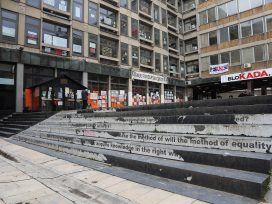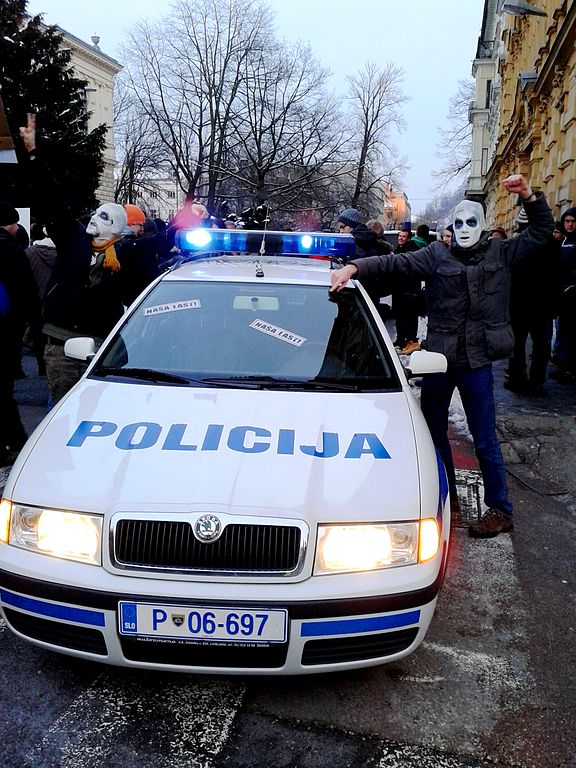
The Serbian student movement symbolizes a generational shift and national renewal. For the first time in years, people are seeing a future for themselves and their children.
As protests continue in Slovenia, Robert Titan Felix sees the need for a programme to protect the welfare state and citizens themselves from the greed of capital, which pushes the less successful to the margins of existence.
Given the interesting manner in which the last novel I worked on as an editor overlaps with (yet also diverges from) recent developments in Slovenian society, I will use it as a thoroughly appropriate point of departure for reflecting on the current situation.
Verdict on Behalf of the People by Tomo Podstensek is about a group of young people who form a sort of extremist cell. They are concerned about current social problems and decide to take action. The elites fail to recognize their social responsibility and the extremist cell intends to force them to do so through intimidation. For when a sword is hanging over someone’s head, they will think carefully about whether to keep stuffing their own pockets. However, the extremist cell does not call into question the way the world is organized or the distribution of power within it. And this is where the novel is highly topical in the way that it overlaps with the protests in Slovenia. Like the cell in the novel that only challenges how particular interests are advanced, the protests are directed less against the way the world is organized and the system as such, and more against particular holders of social power.

Third all-Slovenian riots in Ljubljana in February, 2013. Photo: MZaplotnik, Wikimedia Commons
However, there is one point at which the novel and current social developments diverge – and it was here that I became concerned that the socially critical novel might fail its audience. Then I realized my concern was misplaced. In the novel the people oppose the engagement of the extremist cell. In the name of protecting their own security, the people side in their protests with the elites, whereas on Slovenian streets just the opposite seems to have happened. But has it really? Are not the voices which are already being raised in defence of the elites just a banal expression of the fact that fundamental social change does not interest us, so long as our new car, parked on the street and under lease, is protected from violent protesters? I don’t believe that it is exclusively the members of the elite themselves who are active on the websites pledging support for the elites.
The final realization in the novel Verdict on Behalf of the People is that each person is responsible for themselves: “No one can change another, but each person can change themselves.” And if each of us begins to act more responsibly towards others, one day we will wake up in a much better world. I completely agree with this, but the thought is based on an assumption that I find questionable: it assumes that there is nothing wrong with this world as such, but that there is something seriously wrong with those agents who abuse their positions of power with a view to stuffing their own pockets (and it is on this premise, it seems, that the current heads of the system have come under attack), instead of taking seriously their social responsibility to work for the good of all. However, I wonder whether there is in fact something wrong with the world as such.
Let’s leave literature and return to the street.
Regarding the wave of protests across the country, I have two concerns. The first relates to the choice of timing. Ever since Slovenia has been an independent state, companies have been going bankrupt and workers have gone without wages, and educated young people have lacked prospects since well before the outbreak of protests. But the people came out onto the streets only when that segment of the middle class whose apartments, cars, and televisions were paid for out of the state budget, in the form of state salaries, lost their privileges. Is this just a coincidence, or did those people who remained silent during the protests held by redundant workers, students, and retirees raise their voices because they no longer had a place at the public trough? Could it be that this is not about doubting the world as such, but rather merely frustration at the fact that their share of the pie is steadily shrinking?
The conflict between the state and the people does not appear to be overly complicated. The state simply lacks the finances that would enable it to distribute resources in the same way that it has until now, and those who now fall outside the circle of the privileged due to austerity measures will, together with those who made do without the benefit from any privileges but whose voices have thus far been ignored, pour out onto the streets.
Today in the newspaper I read the view of the government on the resistance to austerity measures: it claims that it will not agree to any compromise, not because it does not want to, but because there simply isn’t any money. But this argument is by no means a reason for us to align ourselves with the elites, telling ourselves that since there is no money we will simply accept the burden and tighten our belts another notch. For if after twenty years of independence the state has found itself at a dead end, then it is abundantly clear that for twenty years it has been moving in the wrong direction. If you convince people to struggle for an independent country and then swiftly establish institutions in that country for the purposes of international integration; and if this means the end of self-sufficiency and the domestic producer is no longer protected even by customs duties, then you have quite simply screwed people over.
Only deluded idiots could have believed that Slovenes would become anything other than a source of cheap labour (which in due course became too expensive anyway), and a dumping ground for the surplus products of more successful economies. This is, after all, the likely foundation upon which all the difficulties we are currently encountering are based. We must therefore ask who has in fact benefited from Slovenian independence. Certainly not the people. Those who certainly did benefit are the few individuals who knew how to exploit privatization for their own ends and, above all of course, those who have screwed us again and placed us in an effectively colonial relationship.
Here lies my second concern. The protests are protests AGAINST and have no FOR; they are an attack on the heads of the system, but not on the system itself, although it is clear to all of us that the problem is not just the swine feeding at the trough but also, and even more so, the trough itself. In other words, the protests have no programme that touches upon our true problem: how to protect the welfare state and citizens themselves from the greed of capital, which pushes the less successful to the margins of existence.
That the world is built on a lie should be clear to us. While it is true that those motivated by selfish interests can achieve better business results, this leads to the creation of a completely unjust world. Resources are limited and if there is more of something in one place and less of it in another, then only certain people can be truly successful and the great majority are condemned to fail. It is those who fail that are convinced by all the stupid handbooks of the type How to Become a Millionaire in Eleven Days that their failure is their own fault, and not simply the way the world works: not all European football clubs can become League champions in the same year. Thus those who fail do not rail against the elites but rather against their own “incompetence”, which amounts to a highly perfidious way of defending the status quo.
The social responsibility of political elites is thus primarily the defence of the little people: the big ones are perfectly capable of taking care of themselves. In the current situation, when we are all trapped by the process of integration into a global (neoliberal) system, this is simply not possible. And so it seems to me that the primary and most urgent goal of the protests should be establishing a programme that will rescue us from this state of affairs.
Published 15 February 2013
Original in Slovenian
Translated by
Jean McCollister
First published by Dialogi 10/2012 (Slovenian version); Eurozine (English version)
Contributed by Dialogi © Robert Titan Felix / Dialogi / Eurozine
PDF/PRINTSubscribe to know what’s worth thinking about.

The Serbian student movement symbolizes a generational shift and national renewal. For the first time in years, people are seeing a future for themselves and their children.

Debate around the cultural sector’s structural inequality often ignores issues of class. Yet behind the success of many practising artists lies an inheritance, allowance or other class privilege. Eight portraits of Belgian artists seek literary revenge, breaking into cultural capital’s invisible economy.